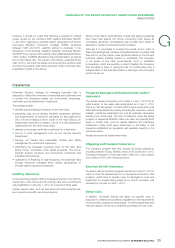APC 2012 Annual Report Download - page 50
Download and view the complete annual report
Please find page 50 of the 2012 APC annual report below. You can navigate through the pages in the report by either clicking on the pages listed below, or by using the keyword search tool below to find specific information within the annual report.
2012 REGISTRATION DOCUMENT SCHNEIDER ELECTRIC48
SUSTAINABLE DEVELOPMENT
2SUSTAINABLE DEVELOPMENT ATTHEHEART OF OUR STRATEGY
In2010, the Responsibility&Ethics Dynamics program put these
ambitions into practice by setting up an organization, procedures
and tools for the Group, so that its employees could:
•provide team members with effective support in their daily actions
and decision-making, primarily through access to the necessary
resources (policies, procedures, tools&best practices);
•help team members identify the appropriate individuals to guide
them in their eco-citizen approach and in each of the areas
covered by the principles;
•know how to notify the authorities of breaches of ethics, with
respect for current laws and regulations.
For more information: see Our Principles of Responsibility pages 57-59 .
1.4 Global policies
Reference documents are distributed throughout the Group so that
all team members can embrace Schneider Electric’s eco-citizen
approach and apply it in line with local culture and legislation.
Ethics
The Our Principles of Responsibility document is not only Schneider
Electric’s ethics charter; it also constitutes a code of conduct. All of
the Group’s policies stem from it (environment, quality, purchases
and the different social policies). The document is available in
30languages and is distributed to all employees.
Environment
The fi rst version of Schneider Electric’s environmental policy
was published in 1992, changed in 2004 and confi rmed in
October 2007. It aims to improve industrial processes, reinforce
product eco-design and incorporate Group customers’ concerns
for environmental protection, while providing product and service
solutions. It applies to the Group and is accompanied by global
action plans.
Social
The Group’s Human Resources policies cover the following:
diversity, hiring, recruiting, international mobility, training, human
capital development, talent identifi cation, total remuneration, social
benefi ts and health and safety. These apply to the Group and are
accompanied by global processes.
1.5 An organization structured through networks
Overall operation
The Sustainable Development Department
The Sustainable Development Department, created in2002, has
been part of the Strategy&Innovation Department since2008. It
has the following responsibilities:
•defi ning Schneider Electric’s sustainable development strategy
and rolling out action plans at Group level with the concerned
entities;
•developing and managing Schneider Electric’s innovative
community projects to ensure continuing improvements in the
Group’s performance in this area.
In2010, the Sustainable Development Department was adapted to
better meet the Company’s present and future challenges as well as
the requirements of stakeholders. It is organized around four areas:
•ethics, steering the Responsibility & Ethics Dynamics program
(see pages 57-60 );
•social responsibility, with the Schneider Electric Foundation as
well as employment opportunity and expansion programs (see
pages87-91 );
•access to energy, responsibility for the BipBop program (see
pages83-87 );
•supporting and developing the Group’s performance, in particular
by steering the Planet&Society Barometer and the strategy and
sustainable development report (see pages 45-47 ).
Supervisory Board
Following James Ross, Cathy Kopp has been responsible for
offi cially presenting the sustainable development issues to the
Supervisory Board since2010. She also acts as internal advisor
for sustainable development: Cathy Kopp analyzed the Group’s
sustainable development policies and programs in 2011,
interviewing various managers. The results were presented to the
Supervisory Board in2012.
In the new governance proposed for the Group in 2013,
the Remuneration Committee’s powers were formally extended
toissues of corporate social responsibility (refer to p. 275 ).
SERE organization – Safety, Environment & Real Estate
(see page 61 ).
Human Resources organization
(see pages 70-71 ).
























